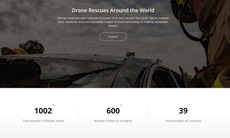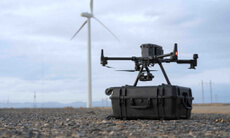Flying Above PTSD
Veteran's Work With Drones Gives New Perspective On Healing
The hardest part for David Daly was the crowds. Shopping for groceries at a busy supermarket, an overwhelming sense of danger would often grip his mind. He instinctively evaluated the customers around him, trying to decide who posed a serious threat. Scanning the aisles, he would make a mental note of where he was most vulnerable and start planning steps to defend himself.
As a veteran of the United States Marine Corps, Daly is one of millions of veterans in the U.S. who struggle with post-traumatic-stress-disorder, or PTSD. Like so many former service members, as he worked to transition back to civilian life, the traumatic events he experienced in combat continued to haunt him. For many years, Daly kept the backpack he was issued by the Marine Corps in the corner of his closet at home, still filled with military gear.
In recent months, however, the pack has found a new purpose. Daly uses it to carry the equipment he needs in his career as a certified commercial drone operator. Flying started out as a casual hobby for Daly, but it’s now become his full-time occupation. And to his surprise, he’s found that getting a new perspective on the world has become a powerful part of his healing process as well.
Like many people, Daly’s first consumer drone was a simple toy. “I had one of those inexpensive $20 drones with a horrible camera on it. I played around with that, thought it was cool, but not really useful outside of having a little fun with it.” In December of 2016 he was surfing around YouTube and came across DJI. “I decided, since the cost wasn’t too bad, on getting a Phantom 3 Standard and playing with that. I really saw it as a hobbyist kind of thing.”
At the time, Daly was treating his PTSD with medication and therapy, working with specialists from the Department of Veterans Affairs and its National Center for PTSD. But despite these efforts, his symptoms were only growing more intense. “I spent most of my free time at home, a prisoner of my own mind,” he recalls.
Daly was hoping his new gadget might be a pleasant distraction, but his experience learning to fly went far beyond that. “The perspective given through the app allows me to take a momentary pause away from my PTSD,” he wrote in a blog post. “That is a 25-minute pause from what haunts me after years of combat. The relief is priceless.”
As Daly began to explore his new hobby, the home he shared with his wife in California was destroyed in a flood. The couple decided to use the crisis as an opportunity, a chance for a fresh start. They bought a house in Lewistown, Montana. Their new home had a population of just under 6,000 people, and Daly hoped that the wide-open terrain might help him to relax and recover.
In California Daly had been working in the construction industry, but there wasn’t as much opportunity for that kind of employment in small-town Montana. So he decided to try something new. “It dawned on me as I was learning more about drones that if I were to upgrade to the Phantom 4 series I had the ability to do some commercial business with it.”
In Montana, Daly found a wide variety of industries were interested in working with drones. He used his Phantom 4 to survey Native American lands for archeological research, capture aerial photographs for tourist attractions, and aid in video production for a chain of gyms opening up around the state. He now owns and operates Vigilante Drones, and is one of the more than 70,000 pilots certified by the FAA to conduct commercial drone operations in the U.S.
As his business grew, the Marine in Daly started looking for ways he could serve the new community that had welcomed him. In the fall of 2017, he reached out to local county officials, offering to assist search and rescue teams with his drone. Daly makes his living as a drone pilot, but he decided to that when it came to search and rescue, he would offer his services for free. Earlier this month, says Daly, his request to join local teams was approved.
What started as a hobby has now become a career and given Daly a new sense of purpose. As he prepares to do search and rescue work with his drone, he has started to look at his old Marine backpack in a different light. “I took stuff out of it that was military related and put new stuff in there like first aid, emergency rations, everything you would need for assisting somebody in those types of situations. I started seeing that it was therapeutic, like flying the drones,” Daly explained. “I can have the darker things out of my mind, replaced by things that are very positive and joyful.”
If you or someone you know is struggling with PTSD, resources are available at the National Center for PTSD’s website
You can also find online help through their PTSD Coach App


